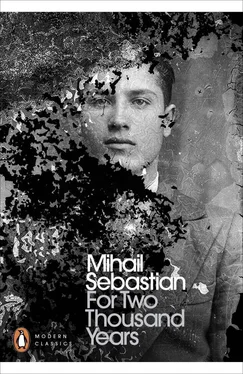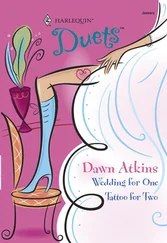I went pale. There was nothing I could do; everything between the two of us — memories, friendship, our professional relationship — turned to nothing. I had a powerful sense that the man standing before me had become a total stranger. He had become so distant, so foreign and inaccessible, that responding to him would have seemed as mad to me as conversing with a block of stone.
I should be sad. I’m surprised that I’m not. It’s as though I’ve been hit in the shoulder by a bullet, and now I’m waiting for the pain. But it doesn’t come.
I have a strange feeling that the name Marin Dronţu belongs to a stranger. It’s like a name from a book. I never imagined that I could forget a person, so deeply, so suddenly, so entirely.
I slept well, dreamlessly. I worked all day.
*
Marjorie came to Snagov. I was on the scaffolding and when I saw her in the distance, in white, it gave me a jolt, as though I were seeing her from years before, in Uioara; the likeness of Marjorie Dunton. I invited her to my room, a hundred paces from the building work, by the lake. Only now have I realized how much this room resembles our cabin from the old days.
Marjorie came on her own initiative.
‘What happened yesterday was awful. Marin told me all about it. It’s ridiculous. Two serious people like you … You must understand. A moment of irritation, of distraction. One doesn’t break off an old friendship over something like that. You understand, don’t you? Tell me you do!’
‘Dear Marjorie, I understand. I understood from the first moment.’
‘So the two of you will make up?’
I shrugged.
‘Obviously! You said it yourself, for God’s sake: we aren’t kids.’
*
Evening boating on the lake, with Marjorie and Marin. We were awkward with each other for a time. We shook hands and skipped the explanations. It’s easier that way.
There was a fine view of Blidaru’s house from out on the water, with only the straight lines of the walls discernible in the dark. The scaffolding, carts loaded with lime and the heaps of stone were immersed in shadow. It soothes me just to look at this house. I only wish I could postpone the day I will complete it.
We’d been silent too long, and Marjorie sensed this. She asked Marin to row back towards the shore.
‘I’m tired, fellows. Come on, carry me. Do you remember? When we were in Uioara?’
Do we remember … I lifted her to ‘Rock-a-bye Baby’, and Marjorie, recalling a moment from that September day long past, took her hat from her head and, waving it like a flag, began to sing as she did then:
It’s a long way to Tipperary
It’s a long way to go.
I was well aware that this was nothing but an effort to invoke among us the shadows of the past, but it didn’t prevent a familiar emotion from taking hold of me.
As I accompanied them to the bus, Dronţu said to me, with a certain languor, a certain heart-weariness, which made up for a lot:
‘You know, life is rotten. We manage to do a heap of rotten things and don’t even wonder at it. It really is rotten. Nobody’s to blame.’
Indeed, nobody is to blame. This is the point we find ourselves at, sooner or later. I know this so well, from the past, from the profound sense that there is nothing that can be done about it. I know that things can’t happen in any other way …
Sami Winkler has departed. In a workman’s shirt, bareheaded, a little knapsack on his back, looking out of the window of a third-class compartment like someone going to the mountains for a couple of days.
I asked him, jokingly:
‘Aren’t you travelling light for a man who’s making history?’
‘No. It’s all I need. I’m leaving the rest behind.’
‘Isn’t that tough?’
‘Pretty tough. So it’s better to make a clean break. To say goodbye to the lot rather than to one thing at a time.’
He was on his own. He’d forbidden his relatives from coming and his travelling companions had gone ahead to Constanţa, to await him on the ship. Next Thursday they’ll be in Haifa.
‘And then?’
He replied by spreading his arms, probably meaning that the answer was too great for a single word: ‘everything’, ‘life’, ‘victory’, ‘peace’ … He was very calm, unexcited, unhurried.
Two boys selling a right-wing newspaper happened along. ‘Take one, gentlemen, it’s against the Yids.’ Their timing made us smile. Sometimes symbolism is too obvious.
Winkler called them over and bought a paper.
‘I brought nothing to read on the trip.’
Indeed, he had brought no books. Not a single one. Then again, books were never really his thing.
We shook hands. I would have liked to embrace him, but I was afraid of the disruption such a show of feeling would have injected in our self-controlled parting. We shook hands.
*
I would like him to prevail, but I find it hard to believe in his victory. I hope he finds peace among his Palestinian orange groves, the peace we have sought in our own ways; S.T. Haim in Jilava Prison, Abraham Sulitzer through journeys and books, Arnold Max through poetry, me on the site, building. The boat cutting through the waves to Haifa will perhaps mark the direction towards a new Jewish history. Will it take him towards a Jewish peace? I don’t know. I don’t believe so. I don’t dare to.
Two thousand years can’t be overcome by leaving for somewhere. They would have to be forgotten, the wound cauterized, their melancholy cut to the ground with a scythe. But the truth is that there are too many years for us to be able to forget them. We live always in the troubled memory of them. The memory reaches far back and hangs like a haze over the horizon of our future. Only rarely, through this history of warfare, victories and kingdoms, does any light pierce the mist. Is it possible to build a new history from such material?
*
Winkler has many fights ahead — and he will win them all. But there is something he must let go of also, and I don’t know if he will succeed. He must let go of his habit of suffering, he must let go of his vocation for pain. This aptitude is too well developed and the instinct too entrenched to yield even before such a simple life. This bitter root can withstand every season and will always be ready to bear its sad fruit, even in the gentlest summer, with the soul lulled by dreams of eternal peace. You will face yourself again in a moment of terror and will learn once again that old lesson you keep forgetting: that you can escape from anywhere, but you cannot flee your own self.
I wish I could reproduce word for word, like a stenographer, the discussion I had yesterday evening with Mircea Vieru.
He had visited me at work. Blidaru’s house is of interest to him too. Mostly he’s interested in it as my building — the first one I’ve done alone. He doesn’t want to make any criticisms. He very much wants to see me bring it all to a conclusion, on my own — which both delights and intimidates me. I’m not certain that I’m really getting it right. Sometimes it all seems inspired, clear and coherent. At other times, the contrary; it’s all lifeless, cold and schematic. I invited the professor, but he didn’t want to come.
‘No. Carry on, do what you want, work how you want. That’s what we agreed. When you’re finished, let me know. Until then, the house is yours.’
From the site, I went with Vieru to the Bucharest road to have dinner. It’s been a full five weeks since I’ve been out of Snagov.
‘I never see you in town any more. Why?’
‘Because I’m fed up with it. It’s the tense, poisonous mood. At every street corner, an apostle. And in every apostle, an exterminator of Jews. It wears me out, depresses me.’
Читать дальше












